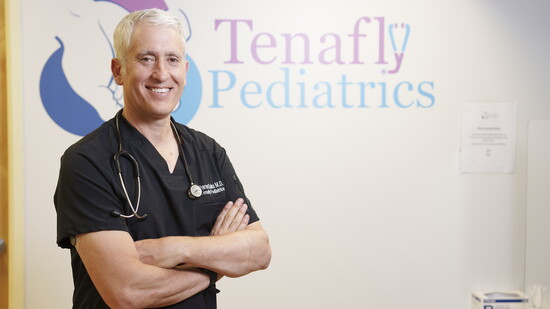Tenafly Pediatrics’ dedication to children’s health is not only admirable—it’s deeply rewarding for the doctors who watch their young patients grow year after year. Founded in 1976 with just two pediatricians in Tenafly, the practice has since expanded to 10 locations across northeastern New Jersey, thanks to its trusted reputation and growing demand.
Dr. Saks joined the practice in 2001, drawn by a love for working with children and the meaningful insights that pediatric medicine provides. Over the years, he has become a valued and familiar face at Tenafly Pediatrics.
In our August issue, Dr. Saks shares important tips on improving your child’s physical and mental health throughout the rest of summer and into the busy back-to-school season:
Fall is just around the corner, making it the perfect time to reinforce healthy habits, commit to new ones, and stay on top of preventive care. An effective way to create lasting change is to keep resolutions focused and simple. Try focusing on three things: one change to improve your mind, one change to improve your body, and a commitment to trying something new. For children, here’s a helpful list that puts that strategy into action:
1. Improve Your Child's Mind: Limit Screen time- Children learn best from being social and navigating their world through play and reciprocal communication. Staring at screens and playing video games does not fulfill that optimal developmental and learning experience. As technology has become increasingly integrated into our daily lives, screen time has surged—so much so that the average school-aged child now spends 6 to 8 hours a day in front of screens, including TVs, tablets, smartphones, and computers. While screens are part of modern life, it’s crucial to be mindful of both the quantity and quality of what your child sees. Excessive screen time can interfere with brain development, sleep, and attention span. The American Academy of Pediatrics recommends:
- Babies under 18 months: No screen time, except for video chatting with family or friends
- Toddlers 18–24 months: Some screen time with a parent or caregiver present, such as educational programming
- Children 2–5 years: Up to one hour of screen time per day, with a limit of three hours on weekends
- Children 6 and older: Limit screen time and encourage healthy habits
- Teens and adults: Up to two hours of screen time per day
2. Improve Your Child's Diet: Cut Added Sugars
We all came from an ancient world where access to sugar, the simplest metabolic boost, was rare and when it was discovered in berries and select foraging foods, we voraciously gobbled it up. That is why we evolved to crave sugar- it was a scarce efficient energy source but now we are in a mismatched world. In the modern world we desire something that is now plentiful. Sugar and refined carbohydrates are best described as the food that nobody needs and everyone craves. These common foods and drinks, loaded with added sugars and refined carbs, are staples in many children’s diets today—but to our ancestors, even brief access to them would have felt like winning the lottery:
· Breakfast cereals
· Candy
· Juices and energy drinks
· Pasta
· Rice
· Bread
Overconsumption of sugar has been linked to obesity, diabetes, tooth decay, cognitive decline, and even cancer.
Recommendations:
· Children under age 2 should avoid added sugars altogether.
· Children age 2 and older should limit added sugar to less than 10% of daily calories (no more than 200 calories should come from added sugars, about 12 teaspoons, for a 2,000-calorie diet)
Parents set the tone—limiting sugar in your child’s diet is one of the simplest and most powerful health decisions you can make. Even better, make the commitment together.
3. Try Something New—Together
One of the most effective ways to ward off dementia and cognitive decline is to dig your heels into a challenging new activity. This is an article focusing on children’s health, so it may seem strange to discuss dementia which is a problem for adults. It is, however, very relevant because the success of a family unit is dependent on the mental health of all its parts, so if a parent or caregiver starts to exhibit mental decline, the health of the family unit declines with it. As a parent, participating in a new activity with your child strengthens your bond and promotes mental sharpness—for both of you. There are so many activities we schedule FOR our children like karate classes, soccer practice, piano lessons, and art classes, but what about the idea of scheduling some of those same activities WITH your children. If you don't know how to play the piano, imagine how wonderful it would be to share the experience of learning to play an instrument alongside your kindergartner. Imagine you have never been a sporty person, but you take tennis lessons WITH your child. Here is a simple list of ideas to explore together:
· Learn a new language
· Take up a new sport
· Practice an instrument
· Try a strategy-based board game like chess, Go, or Mancala
Final thoughts if you’ve made it this far in the article. As summer winds down, pause and ask: How can I best support my child’s well-being? Small, intentional changes can lead to lifelong benefits.
Have a great rest of your summer, and here’s to a healthy, happy start to the school year!
For more information or to make an appointment, visit www.tenaflypediatrics.com/park-ridge-office or call 201-326-7120.
Tenafly Pediatrics' Park Ridge office is open Monday – Thursday from 8:30am to 5:00pm and Friday from 8:30am to 4:00pm. Note that they are closed for lunch 12:30pm – 1:30pm and that they are open on weekends only for sick visits.
"As summer winds down, pause and ask: How can I best support my child’s well-being? Small, intentional changes can lead to lifelong benefits." - Dr. Darren Saks.
